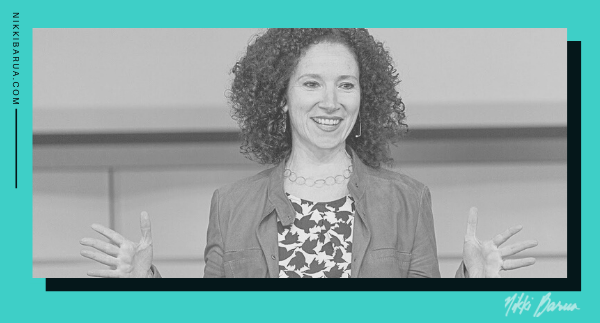My new book, Beyond Barriers, includes profiles of six women who have turned their toughest challenges into their greatest strengths. One of these incredible people is Noha Waibsnaider, Founder of Peeled Snacks. This is her story.
Noha Waibsnaider was born in Israel and spent her early childhood there. When she was four, her father started showing signs of mental illness. Her mother suggested the family move to her native Argentina in the hope that leaving the conflict in the Middle East would improve his mental health. As Noha’s father, formerly a successful economist, lost his hold on reality, everything changed for the family. He could no longer work in his chosen profession, so he wound up earning a much smaller income selling fruits and vegetables at a local market.
Noha’s family struggled to make ends meet, and ultimately, her father’s worsening condition tore the family apart. He was diagnosed with schizophrenia, and in the confusion of his illness, he demanded a divorce from Noha’s mother. Distraught by the loss of her husband, Noha’s mother decided to distance her daughters from the disease and immigrated to the United States. They had to adjust to a new country all over again and faced many hardships as undocumented immigrants. Noha’s life was marked by instability and insecurity. She moved from house to house, ultimately living in thirteen different places in three countries by her fourteenth birthday.
Learning to Adapt
The constant changes, insecurity, and adversity of Noha’s early life taught her to roll with the punches. Noha developed a passionate interest in mental health, and as she looked for contributing factors, she began to focus on how nutrition might have an effect. This obsession evolved into a broader recognition of how food affects our quality of life and well-being.
Eventually, this passion inspired an entrepreneurial idea. In 2004, Noha launched her own company, Peeled Snacks, which makes organic dried fruit snacks without added sugar or preservatives—a healthy alternative to traditional snack foods. The company later expanded to veggie snacks, with pea-based savory puffs that provide protein and fiber. Peeled Snacks’ mission sounded simple—to increase people’s access to healthy food and make them feel good about snacking—but simple things aren’t always easy.
Digging a Tunnel with a Spoon
The company launched long before a major market for organic, healthy food existed, so it had an unproven business model. At that time, the food industry lacked capital for early-stage companies, and Noha couldn’t find willing investors to fund her endeavor. She turned to friends and family for help, but ultimately, she had to use whatever resources she could find just to get the business off the ground. As she describes it, she felt like she was digging a tunnel with a spoon.
Despite the adversity that came from being first in her market and trying to prove the viability of a new product, Noha worked relentlessly. She adapted and navigated through difficult times, including a major setback that occurred when a worldwide mango crop failure left the company with a dire shortage of their number one product for almost a year. In the most difficult moments, she chose to take courageous action because Peeled Snacks was about more than creating a successful business. Noha wasn’t simply trying to sell a product. She was advocating for better nutrition, trying to change the way people eat, and building a movement with a clear mission of improving lives, health, and well-being.
Noha pioneered this space, and her company succeeded as a result. Peeled Snacks still leads in the health food marketplace with distribution in all major retail stores across the country. She continues to use her business and brand as a platform to advocate for better nutrition.
Giving Up or Getting Inspired
Noha’s story illustrates the choices people make after going through extraordinary adversity. When faced with difficult circumstances, a person can react in one of two ways: give up and become hopeless, or use the adversity as inspiration.
Her experiences moving to different countries and adapting to different languages and cultures enabled her to adapt to new situations faster and more easily than most people—a significant advantage when pioneering in business. Her father’s struggle with mental illness fueled her mission of advocating better nutrition for improved mental and physical health.
She led the way with a business idea that didn’t have much initial support, but instead of becoming discouraged and choosing something easier, she stuck with her vision. She built an authentic brand that has become the best-known brand in its category. Above all, she transformed herself and achieved her dream through courageous action and perseverance.
For more advice and stories on how to turn your challenges into successes, check out my new book, Beyond Barriers.
